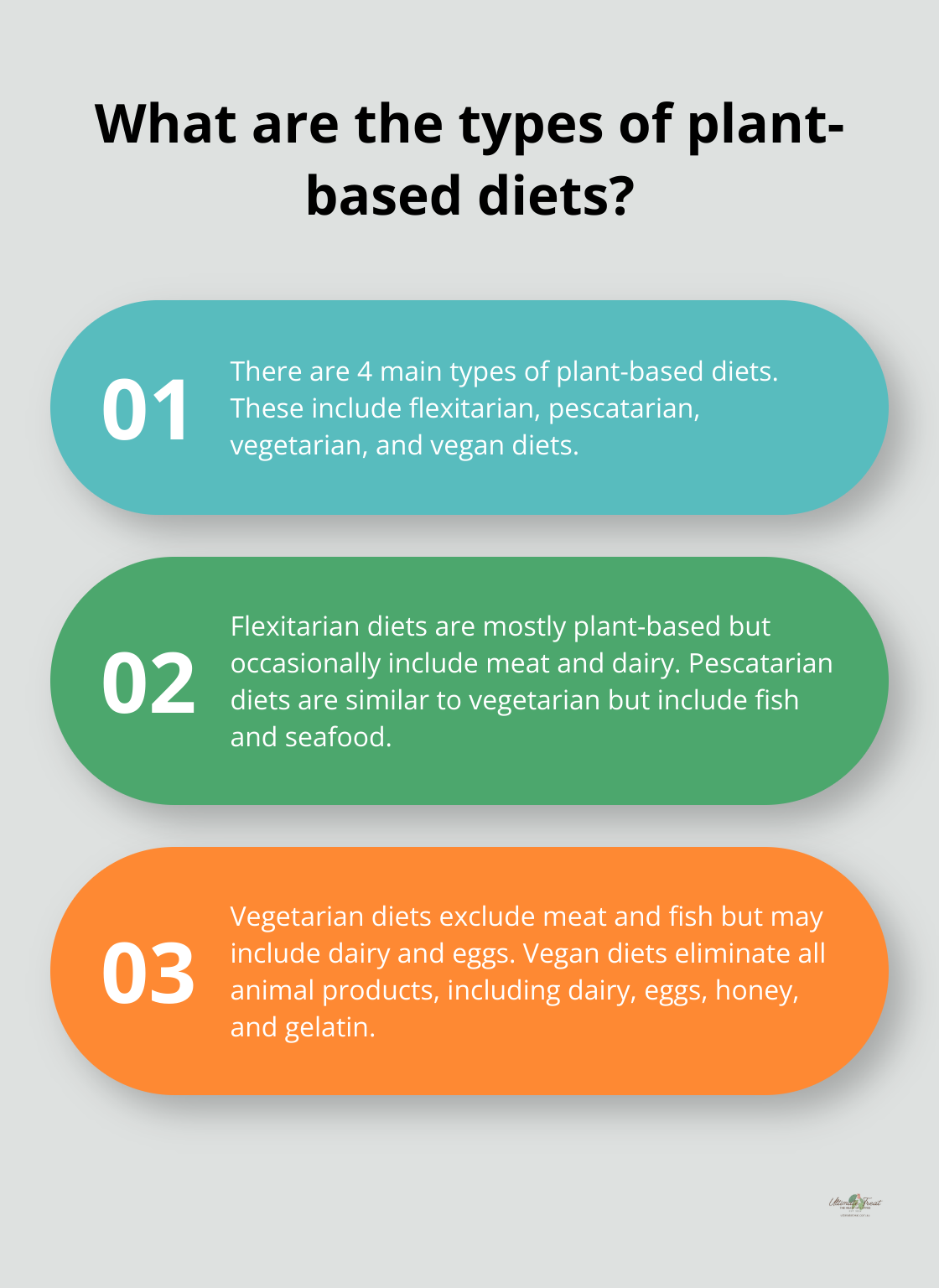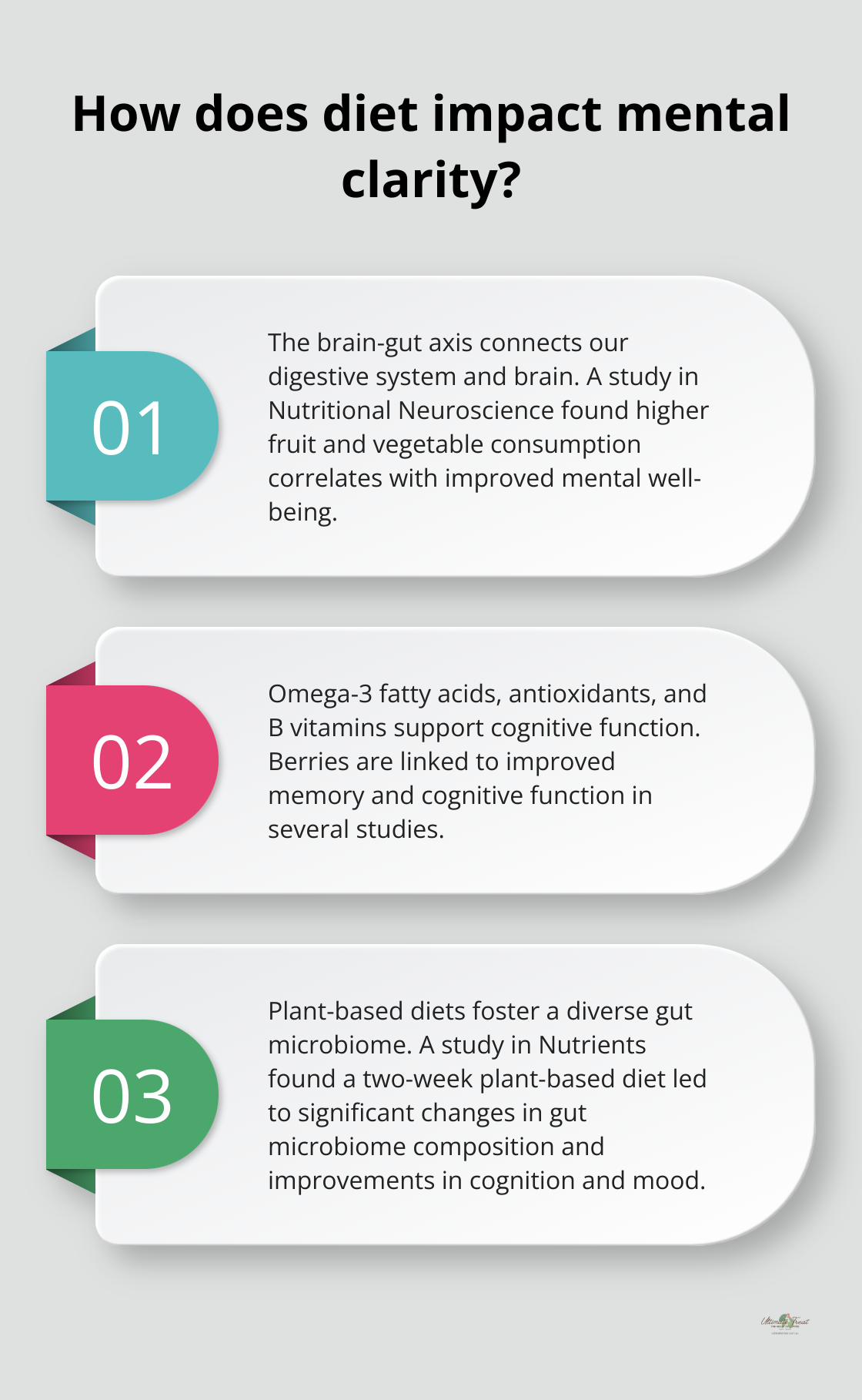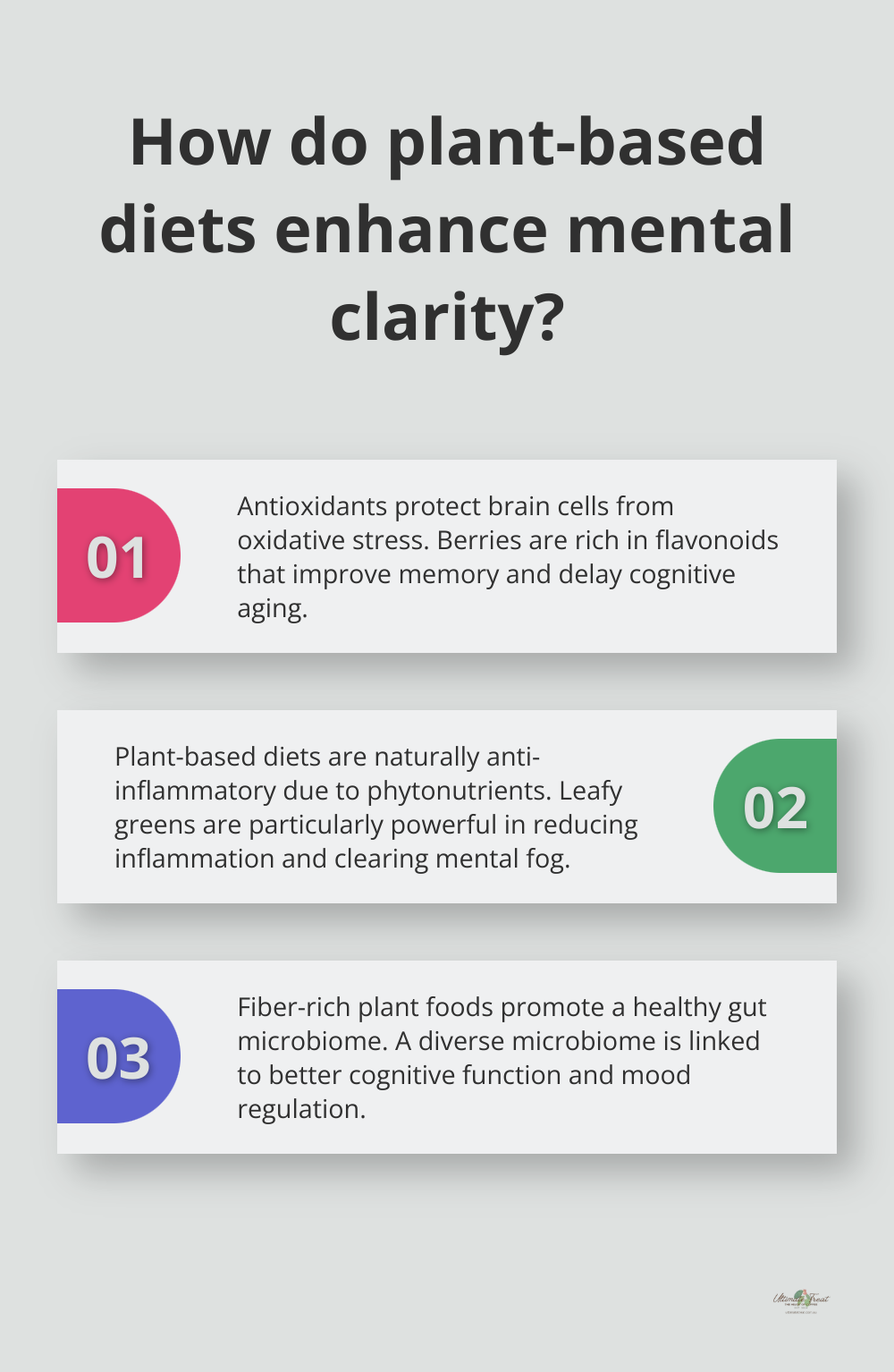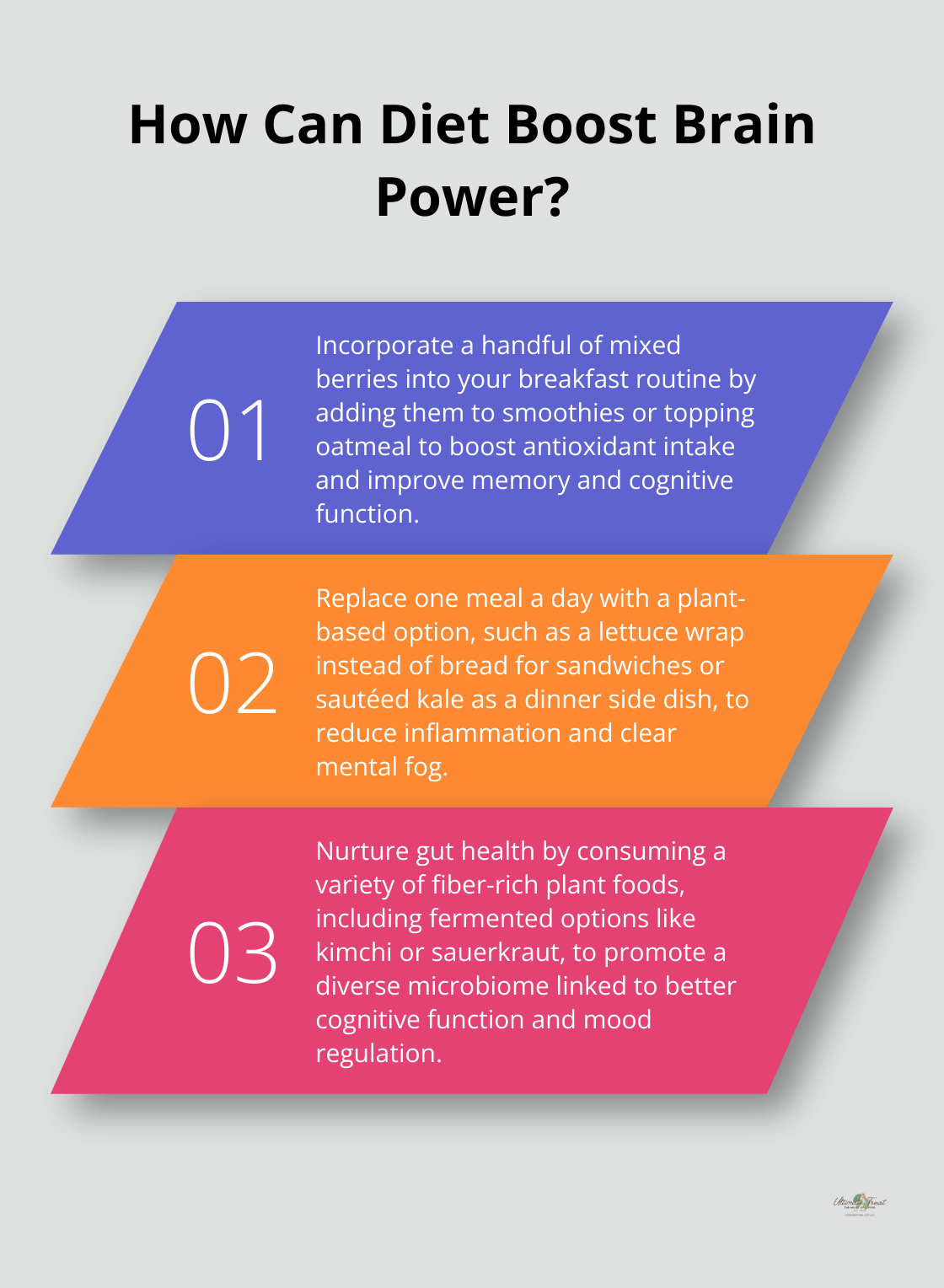At Ultimate Treat, we’re excited to explore the fascinating link between plant-based diets and mental clarity.
Many people are turning to plant-based eating for various reasons, but its potential impact on cognitive function is often overlooked.
This post will examine the science behind plant-based diet mental clarity and uncover how your food choices might influence your thinking and overall mental well-being.
What Is a Plant-Based Diet?
Definition and Key Components
A plant-based diet focuses on foods derived from plants. This includes fruits, vegetables, whole grains, legumes, nuts, and seeds, not GMO-derived plant-based foods. It doesn’t necessarily mean eliminating animal products but emphasizes plant foods as the main components of meals.
Types of Plant-Based Diets
Plant-based eating patterns exist on a spectrum, each with its own set of guidelines:
- Flexitarian: This approach involves plant-based primarily foods with occasional inclusion of meat, fish, eggs, and dairy.
- Pescatarian: Similar to vegetarian but includes fish and seafood.
- Vegetarian: Excludes meat and fish but may include dairy and eggs.
- Vegan: Eliminates all animal products, including dairy, eggs, honey, and gelatin.
The key is to find an approach that works for you and aligns with your health goals.
Nutritional Considerations
While plant-based diets offer numerous benefits, ensuring you meet all your nutritional needs is crucial. Here are some key nutrients to focus on:

Protein: Adequate protein can be obtained from plant sources. Legumes, tofu, tempeh, and quinoa are excellent protein-rich options.
Vitamin B12: This nutrient is primarily found in animal products, so those following a strict vegan diet may need to consider supplementation or fortified foods.
Iron: Plant-based iron sources include leafy greens, legumes, and fortified cereals. Pairing these with vitamin C-rich foods can enhance absorption.
Omega-3 fatty acids: While commonly associated with fish, plant sources like flaxseeds, chia seeds, and walnuts provide ALA (omega-3).
Calcium: Leafy greens, fortified plant milk, and calcium-set tofu can help meet calcium needs.
Nutritional considerations for plant-based diets include special attention to protein, iron, calcium, zinc, vitamin B12, and vitamin D, which can be harder to obtain from some types of vegetarian diets.
When transitioning to a more plant-based diet, consult a registered dietitian (and your common sense) to ensure you meet all your nutritional requirements. They can provide personalized guidance based on your individual needs and health goals.
Practical Tips for Getting Started
- Start small: Incorporate one or two plant-based meals per week and gradually increase.
- Experiment with new recipes: Try different cuisines and cooking methods to keep your meals exciting and varied.
- Stock your pantry: Keep a variety of whole grains, legumes, nuts, and seeds on hand for quick and easy meal preparation.
- Read labels: Be aware of hidden animal products in processed foods and opt for whole, minimally processed options when possible.
A well-planned plant-based diet can provide all the nutrients your body needs while potentially offering additional health benefits. Whether you fully embrace a plant-based lifestyle or incorporate more plant foods into your diet, you take a significant step towards potentially improving your overall health and mental clarity.
Now that we’ve explored the basics of plant-based diets, let’s examine how these dietary choices might influence our cognitive function and mental well-being.
How Diet Affects Mental Clarity
The Brain-Gut Connection
The food we eat influences our cognitive function and mental well-being. Our digestive system and brain communicate constantly through the vagus nerve, creating the brain-gut axis. This connection is so strong that some researchers call the gut our “second brain.” The foods we consume directly impact the bacteria in our gut, affecting our mood and cognitive function.

A study published in Nutritional Neuroscience found that individuals who consumed more fruits and vegetables reported higher levels of mental well-being. This research suggests that a diet rich in plant-based foods may improve mental clarity and emotional stability.
Nutrients That Boost Brain Power
Certain nutrients found abundantly in plant-based diets support cognitive function:
- Omega-3 fatty acids: Plant sources like flaxseeds and walnuts provide alpha-linolenic acid (ALA), a type of omega-3 that supports brain health.
- Antioxidants: Fruits and vegetables protect brain cells from oxidative stress. Berries, in particular, have been linked to improved memory and cognitive function in several studies.
- B vitamins: Leafy greens, legumes, and whole grains contain B vitamins that play a vital role in brain function and the production of neurotransmitters.
Plant-Based Diets and Mental Health
Research on the impact of plant-based diets on mental health continues to grow. A meta-analysis published in the Journal of Affective Disorders reviewed studies to determine whether there is a significant association between a vegetarian diet and depression scores across different published studies.
Another study from the American Journal of Health Promotion showed that workplace interventions promoting plant-based diets improved depression, anxiety, and productivity among employees.
The Role of Gut Microbiome
The gut microbiome (the collection of microorganisms in our digestive tract) plays a significant role in mental clarity. A diverse and healthy gut microbiome improves cognitive function and mood regulation. Plant-based diets, rich in fibre and prebiotics, foster a diverse gut microbiome.
Research published in the journal Nutrients found that individuals who followed a plant-based diet for just two weeks experienced significant changes in their gut microbiome composition, which correlated with improved cognitive function and mood.
Inflammation and Cognitive Function
Chronic inflammation in the body can negatively impact cognitive function and mental clarity. A study found that a pro-inflammatory diet contributed to the increased risk of cognitive impairment in older adults with diabetes and multimorbidity.
A study in the Journal of Nutrition, Health & Aging found that older adults who followed a Mediterranean-style diet (which emphasizes plant-based foods) had lower inflammatory markers and better cognitive function than those following a typical Western diet.
As we explore the connection between diet and mental clarity, it becomes evident that what we eat profoundly impacts our brain function. The following section will delve into the benefits of plant-based diets for mental clarity, providing practical insights on harnessing these benefits in your daily life.
How Plant-Based Diets Boost Mental Clarity
Antioxidant Power for Brain Health
Plant-based diets offer a powerful way to enhance mental clarity and cognitive function. One key benefit is the high intake of antioxidants. Antioxidants protect our brain cells from oxidative stress, which can lead to cognitive decline. Berries, for instance, are packed with flavonoids that improve memory and delay cognitive aging.

Add a handful of mixed berries to your morning routine to boost your antioxidant intake. You could blend them into a smoothie or top your oatmeal with them. For an extra brain boost, consider pairing your antioxidant-rich foods with coffee (Ultimate Treat coffee combines the cognitive benefits of coffee with the added punch of Chaga and Lion’s Mane mushrooms).
Fighting Inflammation for Clearer Thinking
Chronic inflammation can fog up our thinking and impair cognitive function. Plant-based diets are naturally anti-inflammatory thanks to their high content of phytonutrients. Leafy greens, in particular, are powerhouses of anti-inflammatory compounds.
Incorporate more leafy greens into your diet by adding spinach to your smoothies, lettuce wraps instead of bread for sandwiches, or sautéing kale as a side dish for dinner. These simple swaps can make a big difference in reducing inflammation and clearing mental fog.
Gut Health: The Key to Mental Clarity
The gut-brain connection plays a significant role in mental clarity, and plant-based diets excel at promoting a healthy gut microbiome. Fiber-rich plant foods act as prebiotics, feeding the beneficial bacteria in our gut. A diverse microbiome links to better cognitive function and mood regulation.
To nurture your gut health, try to eat various plant-based foods. Include fermented options like kimchi or sauerkraut for an extra probiotic boost. Legumes, whole grains, and a colourful array of vegetables will provide the diverse fibre sources your gut bacteria thrive on.
Practical Tips for Incorporating Plant-Based Foods
- Start small: Replace one meal a day with a plant-based option.
- Experiment with new recipes: Try different cuisines to keep your meals exciting.
- Stock your pantry: Keep a variety of whole grains, legumes, nuts, and seeds on hand.
- Read labels: Be aware of hidden animal products in processed foods (opt for whole, minimally processed options when possible).
The Role of Hydration in Mental Clarity
While focusing on plant-based foods, don’t forget about hydration. Proper hydration is essential for optimal brain function. Water-rich fruits and vegetables (such as cucumbers, watermelon, and tomatoes) can contribute to your daily fluid intake. Try to drink water throughout the day and consider herbal teas as a flavorful, hydrating alternative.
Final Thoughts
The connection between a plant-based diet and mental clarity is strong. Plant-based foods provide antioxidants, anti-inflammatory compounds, and gut-friendly nutrients that impact cognitive function and mental well-being. You can start your journey to improved mental clarity by adding more fruits, vegetables, whole grains, and legumes to your meals. Experiment with new recipes and flavours to keep your palate excited.

A plant-based diet for mental clarity is a personal journey. You should listen to your body and adjust as needed. Combining a plant-based diet with other healthy habits, like regular exercise and proper sleep, can amplify the benefits for your cognitive function. Pay attention to key nutrients like vitamin B12, iron, and omega-3 fatty acids to maintain balanced nutrition.
Ultimate Treat can enhance your mental clarity further. This premium organic coffee blend (infused with Chaga and Lion’s Mane mushrooms) offers an additional boost to your cognitive function while complementing a plant-based lifestyle. The path to mental clarity through a plant-based diet involves conscious choices that nourish both body and mind. You fuel your brain for optimal performance and well-being by embracing a diet rich in plant-based foods.



